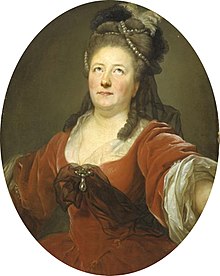Friederike Sophie Seyler
Friederike Sophie Seyler , formerly Sophie Friederike Hensel (* 1737 or 1738 in Dresden ; † November 22, 1789 in Schleswig ; née Sparmann, married Hensel and later Seyler), was a German actress . She was considered the most famous German actress in the second half of the 18th century, in particular as the leading actress in the theater companies of her second husband Abel Seyler , the Hamburg Entreprise and the Seyler's Drama Society . Gotthold Ephraim Lessing called her in the Hamburg Dramaturgy "undoubtedly one of the best actors the German theater has ever had." Your Singspiel Hüon und Amande (1789) served as a major influence on the libretto for Die Zauberflöte .
Life
Sophie Friederike Hensel was born in Dresden as the only child of the doctor Johann Wilhelm Sparmann and his wife Luise Catharina Pöppelmann. She was a granddaughter of the builder Matthäus Daniel Pöppelmann . Her parents divorced when Sophie was 11 years old. Since her mother entered a pen, Sophie grew up with an uncle who is said to have treated her so badly that she fled first to another relative and later to the stage.
From 1754 she was a member of the Schuch Society in Danzig and Breslau, where she married the actor Johann Gottlieb Hensel a year later, from whom she separated again in 1759. For some time she commuted between Vienna, Frankfurt and Hildburghausen and even toyed with the idea of giving up acting because of her poor health. Eventually she became a member of the Ackermann Society in Hamburg. The previously unknown actress Karoline Schulze competed with the celebrated tragedy, so that Hensel participated in the founding of the Hamburg National Theater , which led to the split in the Ackermann Society and drove Schulze to Leipzig. In Hamburg, Hensel was the undisputed first tragic actress.
After the end of the Hamburg National Theater in 1769 and a renewed split in the Ackermann Society, she moved from stage to stage with the " Seyler 's Society", which was directed by her lover Abel Seyler . In 1787 she finally settled in Schleswig with Seyler, whom she married in 1772, where he became director of the court theater and she stood on the stage until her death in 1789 (according to some sources also in 1790). Her husband was the father of the Hamburg banker Ludwig Erdwin Seyler , head and co-owner of the Berenberg Bank , and Sophie Seyler (1762–1833), who was married in 1781 to the poet Johann Anton Leisewitz .
meaning
Sophie Friederike Hensel was next to Friederike Caroline Neuber as the most important actress of her time, who mastered the most diverse characters, but above all shone in passionate, tragic roles such as Klytaimnestra , Medea or Hamlet's mother. A contemporary engraving from the theater calendar shows it to be an unattractive but imposing appearance.
The poet Gotthold Ephraim Lessing named Sophie Friederike Hensel one of the best German actresses and mentioned her several times in his Hamburg Dramaturgy . He praised the ease and precision of her declamations, from which no wrong note escaped from the most confused verse, and her refined playing. He was particularly impressed by how she mastered the dying scene as the title hero in his play Miss Sara Sampson . He wrote of her: “Not a word falls from her mouth to the earth. What she says she has not learned, it comes from her own head, from her own heart. She may speak or she may not speak, her game goes on uninterrupted. "
In addition, "die Hensel" was also considered an extremely difficult actress who reacted insulted to the slightest criticism and caused tension through her great vanity and role-addiction.
In addition to her acting, she also wrote several plays. Her drama The Abduction or the Tender Mother - based on a novel by the Irish writer Frances Sheridan - was performed frequently in the 1770s. It took up the popular theme of “persecuted innocence”, but concentrated less on the dramatic scenes between the abductee and the kidnapper and more on the upheavals in the abductee's family, especially the domineering mother and her black and white morality.
Hensel also wrote the libretto for a Romantic Singspiel called Hüon and Amande, which was a crowd-puller in Hamburg at the end of the 18th century. The libretto of the Singspiel Oberon, König der Elfen , composed by Paul Wranitzky , was also an adaptation of Hensel's text by the Viennese actor Carl Ludwig Giesecke .
Works
- The family in the country (1770)
- The Abduction, or The Tender Mother (1772)
- Hüon and Amande (1789)
See also
Individual evidence
- ↑ Hamburg Dramaturgy , Fourth Piece. In: Lessing's works , ed. by Georg Witkowski, vol. 4, p. 355, 1766
literature
- Joseph Kürschner : Hensel, Johann Gottlieb . In: Allgemeine Deutsche Biographie (ADB). Volume 11, Duncker & Humblot, Leipzig 1880, pp. 787-789. (covered in the article about her husband)
- Andrea Heinz: Seyler, Sophie Friederike, née Sparmann. In: New German Biography (NDB). Volume 24, Duncker & Humblot, Berlin 2010, ISBN 978-3-428-11205-0 , p. 301 ( digitized version ).
- Friederike Sophie Hensel: The kidnapping or the tender mother , drama 1772. Wehrhahn Verlag Laatzen (2nd edition 2004). ISBN 3-86525-012-2 .
Web links
- Literature by and about Friederike Sophie Seyler in the catalog of the German National Library
- Friederike Sophie Hensel: The kidnapping or the tender mother, drama 1772. Digitization (PDF file; 464 kB)
| personal data | |
|---|---|
| SURNAME | Seyler, Friederike Sophie |
| ALTERNATIVE NAMES | Sparmann, Sophie Friederike (maiden name); Hensel, Sophie Friederike |
| BRIEF DESCRIPTION | German actress |
| DATE OF BIRTH | 1737 or 1738 |
| PLACE OF BIRTH | Dresden |
| DATE OF DEATH | November 22, 1789 |
| Place of death | Schleswig |


